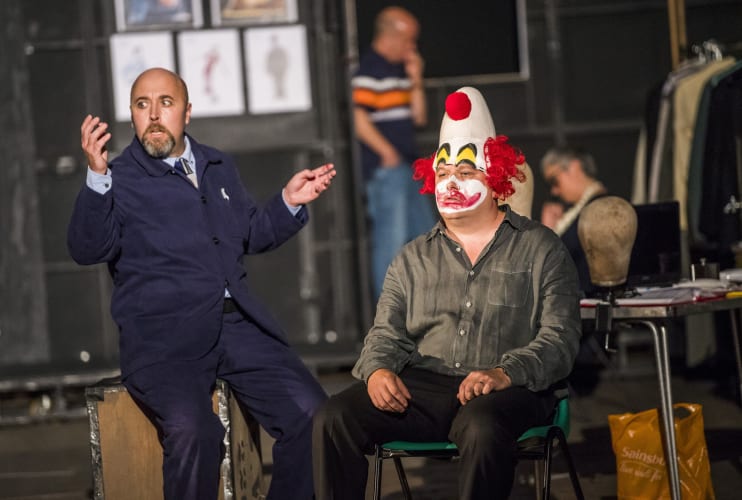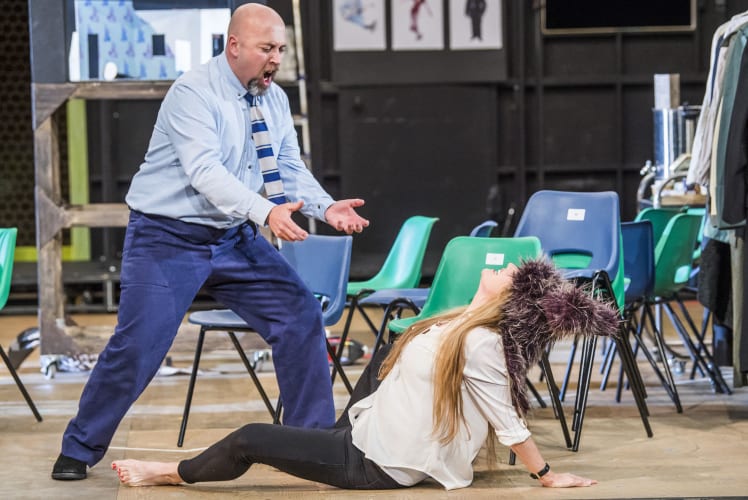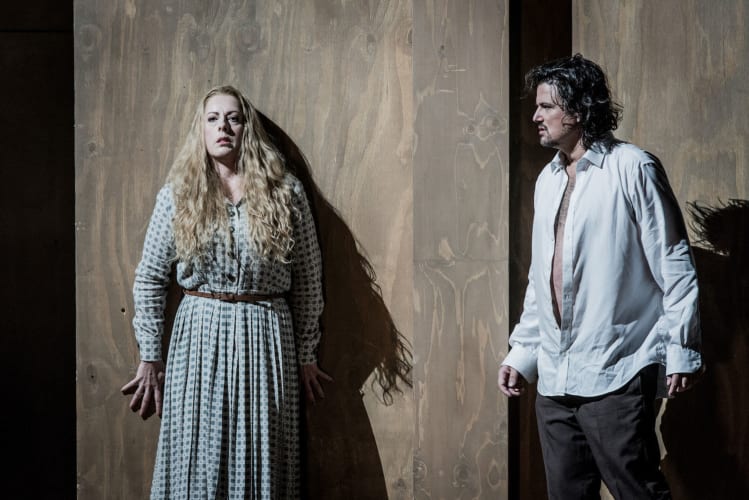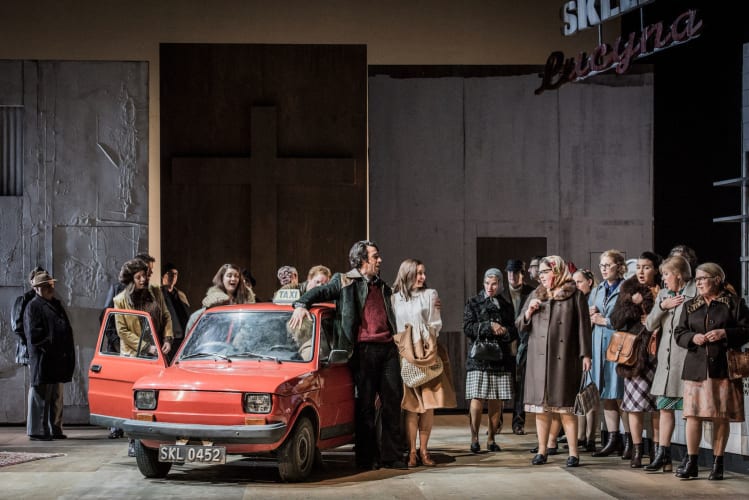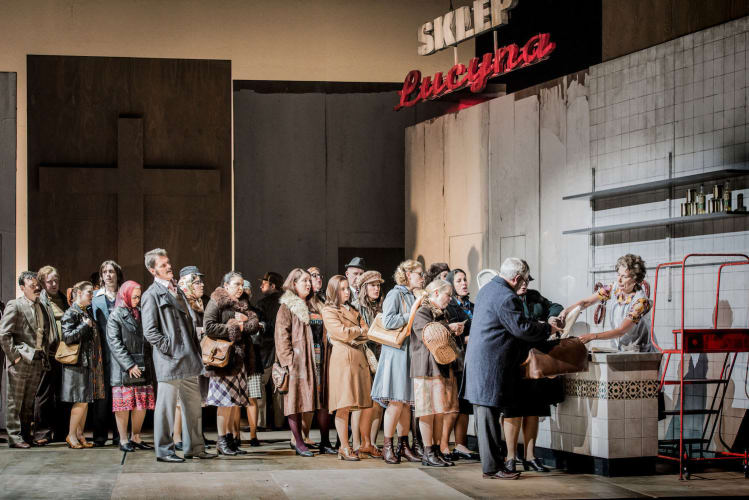Cav and Pag: the best known and surely the most frequently produced double header in the opera catalogue. It isn’t hard to see why. Each is highly accessible, each has its own instantly recognisable tune (Leoncavallo’s “Vesti la giubba” and Mascagni’s lovely intermezzo). Each piece is set in a devoutly Catholic, rustic community. Each features transgressive passion, seething jealousy, betrayal and a murderous finale.
Despite these parallels, Opera North bring us two very distinct approaches in this opener to their autumn season of “The Little Greats’ at the Lowry.
Charles Edwards presents a convincingly realistic set for Pagliacci: the village hall, accommodating a group of travelling players, mid-rehearsal as we join them. The troupe is led by Canio, played by Peter Auty as an egotistical demagogue. His fellow players greet him with apparent warmth, but there is menace and fear in the room. Canio’s ego must be stroked, or else… “Think twice about playing games with me,” he warns, when a member of his company foolishly hints that Canio’s wife may be ‘playing away’.
Canio’s no-longer-loving wife, Nedda, has eyes for the handsome pianist, Silvio. They plan to run away together that night, but Nedda, with good reason, is fearful of Canio’s violent temper. To complicate matters further, the company’s designer, Tonio, is also in love with Nedda. When Tonio makes his feelings known to her, Nedda’s heartless mockery proves to be a fatal mistake.
Edwards’s set and lighting design are more successful than his directorial choices. The actors (and this seems to be a conscious choice) come across as stiff and detached in “real life” as well as when acting in their comedy. Elin Pritchard’s Nedda is given particular problems by this approach, never seeming able to locate herself as a young woman loved by three men. Pritchard’s singing voice is not to be faulted, though (as with the others) it is often delivered to the house, not to those on stage, with whom we might expect her to interact. At times, we might be watching an attempt at Brecht, though the impact is more often confusing than thought-provoking.
Nevertheless, there are some interesting choices and effective moments, here. Silvio, the lover, is clearly cowardly, despite his protestations to the contrary. This, combined with Nedda’s cruelty, Tonio ruthless scheming and Canio’s violent bullying, leaves us with no one to side with, which is… novel. There is genuine humour during the ‘show within a show’, e.g. when the chicken dinner is served up with wine and candles via a microwave (it just doesn’t sit well with everything else in the production).
Were it not for the charisma of Richard Burkhard’s Tonio, the striking “frontdrop” photograph of the entire cast might well be the star of this production. Burkhard holds it all together and provides a focus for the eye on on overly-busy stage.
Most seasons, the ON team manages to come up with at last one show that can stand shoulder-to-shoulder with anything in the country (if not the world). Their production of Cavaleria Rusticana is surely a contender this year.
Polish director Karolina Sofulak has chosen to relocate the story from 19th century Sicily to late 20th century Poland. The set presents more good work by Charles Edwards—three locations simultaneously: stage right, a humble domestic interior; stage left, the local grocery store (Sklep Lucyna); centre stage, a crucifix in bas relief, the church. The space is used fluidly, leading us through interiors and exteriors without awkwardness.
During the overture, the key players mime a prelude to the story. This has all the grace and clarity of a ballet. We see how rebellious mummy’s boy, Turiddu, loved Lola but lost her to Alfio, and sought to ease his pain through the heated seduction of the devout Santuzza. Tim Claydon’s rich and meaningful movement direction is a key element in the resounding success of this show. Meaning drips from every gesture.
Santuzza has sacrificed her honour for Turiddu, who cannot get over his lost love. He sings of his pain, upstage, back to the audience, as if he cannot bear to let it be seen. Alfio, meanwhile, is determined to provide for his new bride; not just fixing wallpaper in their home, but buying himself a taxi—a little red Fiat—immediately the talk of the village.
As queues form at the grocery store (owned by Turiddu’s mother, Lucia), with its almost bare shelves, we see the sham of fairness and egalitarianism—the better-dressed in the community jump the queue, while some who were there first leave empty-handed. Life isn't fair.
Lucia shows little sympathy for the disgraced Santuzza, yet each of these women worships Turiddu—a scene in the church transforms into searing metaphor: Lucia helping her son onto the cross, Santuzza having quite literally played the Magdalen, wiping his bare feet with her own hair.
Turiddu is in turmoil—torn between the very different passions of these two women and a separate burning desire of his own: to be with Lola. Petulantly, he undoes the shirt button his mother has just carefully, cloyingly fastened. He assures Santuzza of his love whilst in the act of making love to Lola (the virtues of a non-naturalistic set).
Finally understanding that she has sacrificed her honour for a man who will never love her, Santuzza tells Alfio what is going on between Lola and Turiddu. The distraught young husband returns home and wreaks havoc—overturning the chair, ripping up the rug, tearing down the wallpaper, even daring to smash the picture of John Paul II. Falling to his knees in despair, his grief carries us through the intermezzo, adding a sharpened edge to the poignancy of the music.
Previous productions I have seen of this piece have left the drama to occur offstage (Greek tragedy style). Here, there is a brutal finale right before our eyes, as Turiddu goes to pay his “debt” to the wronged Alfio.
Having set Alfio on the path of vengeance, Santuzza rights the upturned armchair and settles down to watch the sentence be carried out. This, in itself, is a directorial masterstroke (one of several Sofulak pulls off): Turiddu’s parting injunction that his mother must ‘look after Santuzza’ is piled with searing irony as the woman he pities gloats on from across the stage.
The ON chorus is as brilliant as it always is, but all the principles here are outstanding. Jonathan Stoughton’s Turiddu is an intentionally exasperating boy/man; wilful, spoilt, blindly obsessed with his own addiction to Lola (Katie Bray, making us believe she is that one girl in the village no man can resist). Philip Rhodes brings substance and the dignity of a simple, decent man to the role of Alfio; we can both see why Lola should be happy with him and yet comprehend why she isn’t. Rosalind Plowright excels as the smothering Lucia—her voice is impeccable, as is her acting; there’s a quiet magnificence in the way she slumps listlessly against the wall of her shop, knowing her beloved son is doomed.
Above all, Giselle Alen gives a bravura performance as Santuzza. Kneeling at the foot of the cross at curtain up, she has a stillness that makes her seem almost part of the set, soon to be surprised and overwhelmed by a man whose lust for another is acted out upon her body. Her love for Turiddu is as devout as her love for Christ (before she fell from grace). Having shifted from maiden to Magdelen, her final metamorphosis is to howling Medea. Her voice is strong and faultlessly modulated throughout, but the complex blend of retribution and loss she brings to her closing proclamation of Turiddu’s fate chills the blood. Bravissima!
